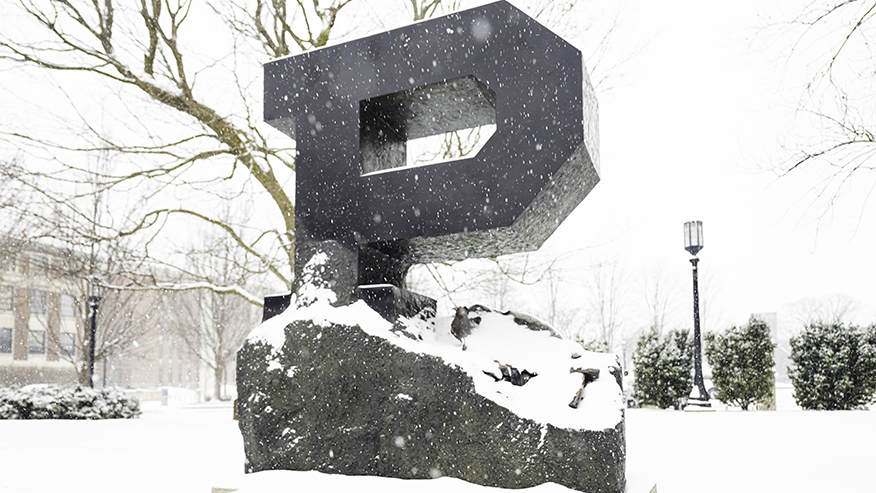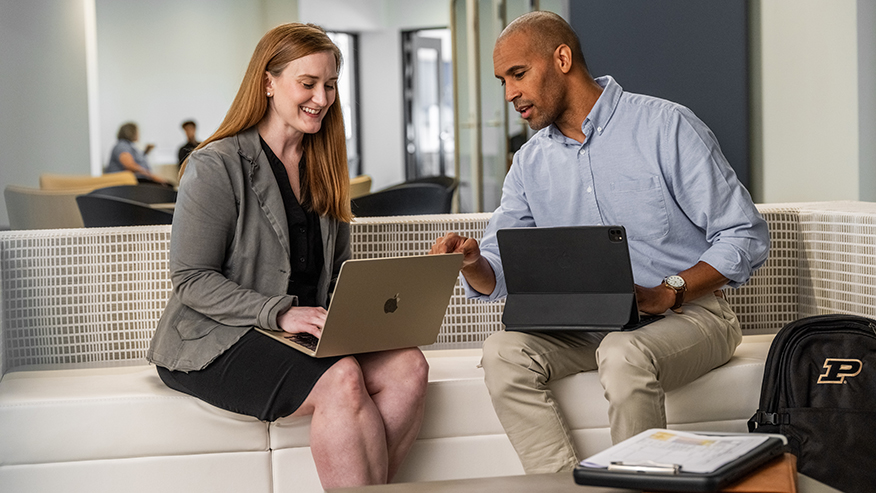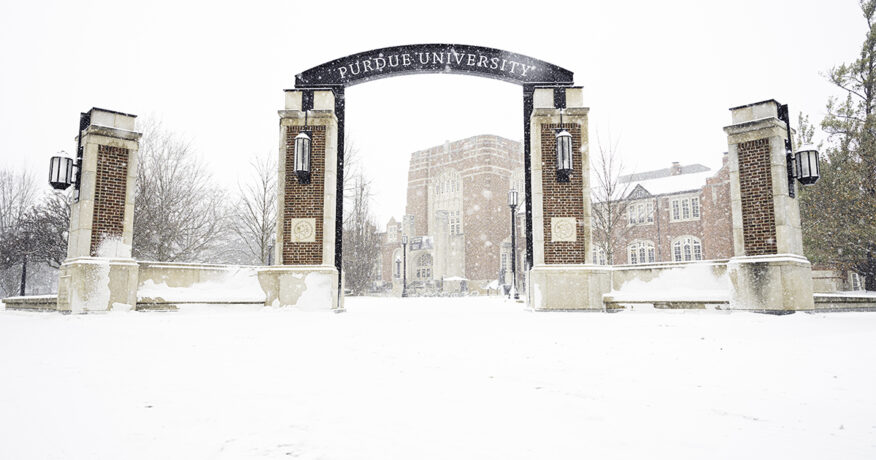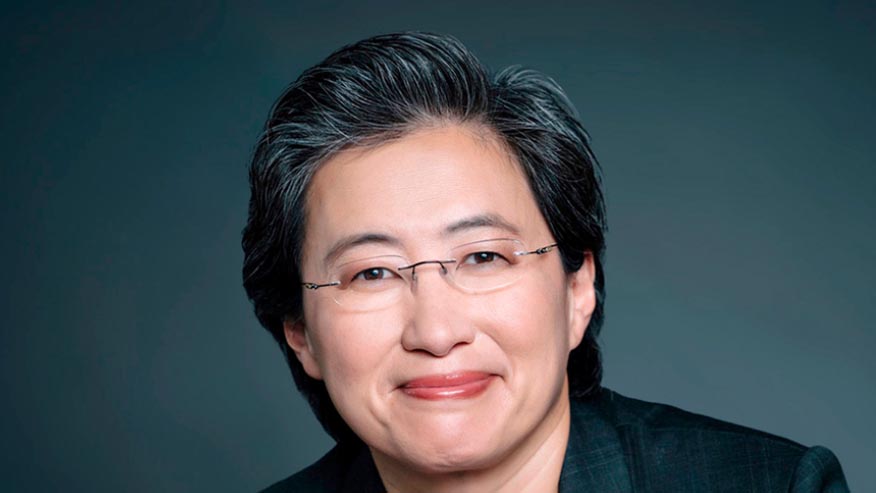Purdue trustees ratify faculty and staff positions
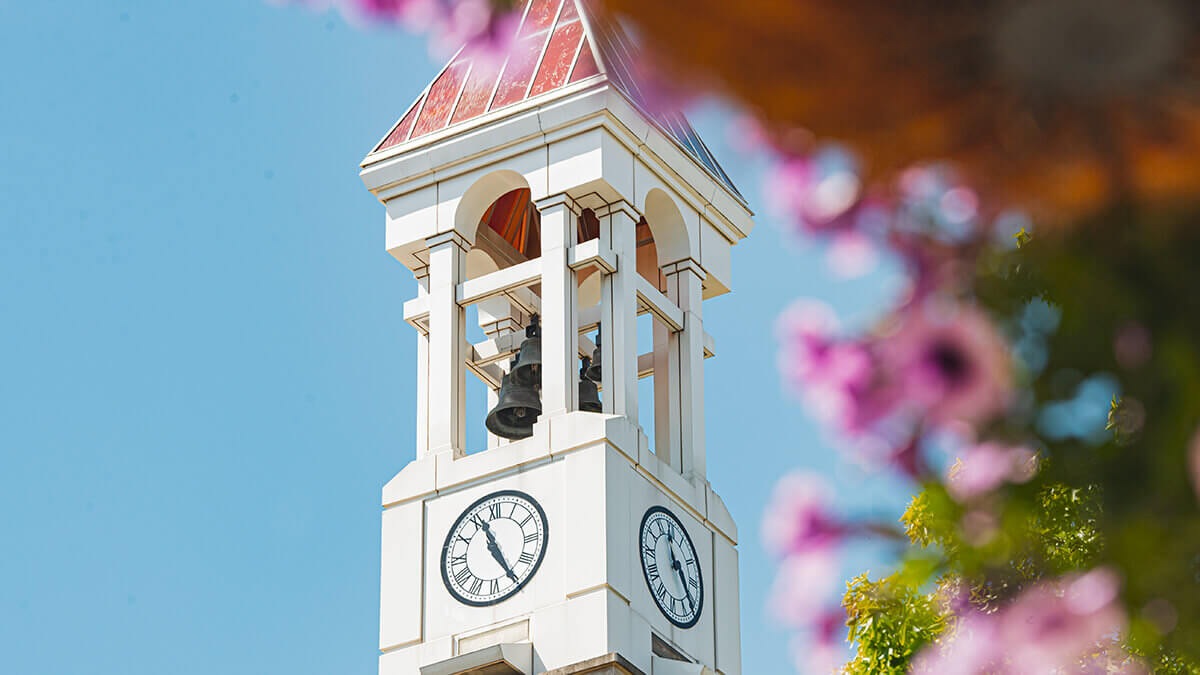
WEST LAFAYETTE, Ind. —
The Purdue University Board of Trustees on Friday (Aug. 4) ratified faculty and staff appointments, recognizing efforts in discovery, learning and engagement that have advanced Purdue’s land-grant mission while elevating its reputation as a leading research university across the country and around the world.
The newly ratified positions are:
- Michael Sangid, who was named the Reilly Professor of Aeronautics and Astronautics Engineering.
- Sherif Elfayoumy, who was named the Steel Dynamics Endowed Dean of the College of Engineering, Technology, and Computer Science at Purdue Fort Wayne.
- Leonard Harris, who was named the Joyce and Edward E. Brewer Chair in Applied Ethics.
- Melba M. Crawford, who was named the Nancy Uridil and Frank Bosseu Distinguished Professor in Civil Engineering.
- Andrei Gabrielov, who was named a Distinguished Professor of Mathematics.
- Jie Shen, who was named a Distinguished Professor of Mathematics.
- Alexandra (Sasha) Boltasseva, who was named the Ron and Dotty Garvin Tonjes Distinguished Professor of Electrical and Computer Engineering.
- Carol Handwerker, who was named the Reinhardt Schuhmann, Jr. Distinguished Professor in the School of Materials Engineering.
- Scott Sudhoff, who was named the Michael and Katherine Birck Distinguished Professor of Electrical and Computer Engineering.
- Rao S. Govindaraju, who was named the Christopher B. and Susan S. Burke Distinguished Professor in Civil Engineering.
- Fabio Ribeiro, who was named the W. Nicholas and Elizabeth H. Delgass Distinguished Professor in Chemical Engineering.

Sangid is developing new approaches to the design, manufacture and life analysis of structures and materials – leading to safer, more energy-efficient and higher-performing aerospace components. Through collaboration with major aerospace gas turbine companies, he has addressed critical production issues and resolved long-standing materials problems. Sangid established and serves as executive director of the Hypersonics Advanced Manufacturing Technology Center (the first contract awarded to the Purdue Applied Research Institute) to foster collaboration among industry partners, facilitate innovation in high temperature materials, reduce the time and cost of prototyping, and accelerate progress in the field of hypersonics. He spearheaded the design, development and deployment of Virtual Labs, offering students a more interactive and enriching laboratory experience, and is helping to integrate these experiences into various courses throughout the university.

Elfayoumy joined Purdue Fort Wayne in July from the University of North Florida, where he had most recently served as director of the School of Computing since 2015. Elfayoumy was with UNF since 2000, also serving as a professor and associate dean of the College of Computing, Engineering and Construction. Among his honors was the FIS Distinguished Professor Award in 2014. Elfayoumy has extensive experience in strategic planning, innovation, fundraising, administration and the promotion of academic achievement. His research interests include data analytics and data mining. He has published approximately 50 peer-reviewed articles, conducted more than $1.7 million in funded research and been awarded three patents. Elfayoumy’s leadership experience in computer science further supports one of Purdue Fort Wayne’s strongest and fastest-growing programs.

Harris has developed a new conception of racism that says it is primarily actuarial; that is to say, it is a matter of the distribution of life chances, including both health and sickness, and the artificial shortening of life. He calls this “necro-being.” This conception of racism, as well as his new conception of ethics more generally (called “insurrectionist ethics”) and his new conception of philosophy itself (called “philosophy born of struggle”), has had a significant influence on the field of philosophy. Harris’ work has contributed to the creation of the new Africana Philosophy subfield, which has become a disciplinary specialty recognized by the American Philosophical Association. He also has led a fundamental reevaluation of the African American philosopher Alain Locke, and the establishment of Locke as a major figure in the American philosophical movement known as pragmatism. For this work, Harris was awarded the prestigious Herbert Schneider Award of the Society for the Advancement of American Philosophy. Additionally, Harris has earned numerous prestigious fellowships and visiting appointments – including Fulbright Scholarships in Ethiopia and Uganda – fellowships at Harvard and the Tuskegee Institute and visiting appointments at Cambridge University and the Catholic University of Leuven.

Crawford is an internationally renowned scientist, engineer and leader in the field of remote sensing. She has pioneered and advanced the state-of-the-art in the use of machine learning methods for remotely sensed image data. Her contributions have resulted in vital new capabilities to address urgent problems in agriculture, geotechnical engineering, and environmental mapping and monitoring. Crawford is a professor of civil engineering and agronomy, the Nancy Uridil and Francis Bossu Professor of Civil Engineering, director of the Laboratory for Applications of Remote Sensing and a key member of Purdue’s Digital Forestry interdisciplinary team. Her honors include the 2023 Institute of Electrical and Electronics Engineers (IEEE) Mildred Dresselhaus Medal for contributions to remote sensing technology and leadership in its application for the benefit of humanity, the IEEE Geoscience and Remote Sensing Society David Landgrebe Award, the IEEE GRSS Outstanding Service Award and NASA’s Outstanding Service Award.

Gabrielov is a talented and influential mathematician who has impacted a broad range of theoretical mathematics, where his work has been instrumental in the creation of entirely new research directions and their subsequent development. His contributions span mathematical logic, topology, algebraic geometry, complex analysis and differential equations. Additionally, he has made contributions to applied fields. His work in geophysics resulted in new models of seismicity and improved the prediction and understanding of earthquakes, and he has been invited to speak at nearly 170 major scientific events around the world, including in Japan, Poland, Italy, France, Brazil, New Zealand, Mexico, Israel and Spain. Gabrielov was placed among the top 0.1% of world mathematical geophysicists and experts in earthquake prediction theory by a senior research fellow and research professor at the Karlsruhe Institute of Technology in Germany, a member of Academia Europaea and a former secretary general of the International Union of Geodesy and Geophysics. Gabrielov is also a fellow of the American Mathematical Society.

Shen has made contributions in many areas of computational and applied mathematics, including theoretical numerical analysis, scientific computing, computational fluid dynamics and computational materials science. A particular emphasis of his work is the development and analysis of high-order methods. For more than a decade, Shen has served as Purdue’s director of the Center for Computational and Applied Mathematics. He was ranked No. 4 in the world for single-year impact and No. 9 in the world for career impact in the field of numerical and computational mathematics in Stanford’s 2022 World’s Top Scientists and is a recipient of a Fulbright Award. He is also an elected fellow of the American Mathematical Society and an elected fellow of the Society of Industrial and Applied Mathematics. He serves as a member of eight editorial boards for peer-reviewed journals in his field.

Boltasseva works in the fields of nano- and quantum photonics, plasmonics and optical metamaterials. The central focus of Boltasseva’s research is finding new ways for realization of photonic devices from material growth and advanced designs to nanofabrication and device demonstrations. She is currently the workforce development lead of the Quantum Science Center within the U.S. Department of Energy Office of Science National Quantum Information Science Research Center. She also served on the Materials Research Society (MRS) board of directors and the Optica (previously Optical Society of America) board of editors and publications council. She is a past editor-in-chief for the Optical Materials Express journal of the Optica Publishing Group. Her honors include the Optica Society R.W. Wood Prize, the IEEE Photonics Society Young Investigator Award, the MRS Outstanding Young Investigator Award and the MIT Technology Review TR35 Award. Boltasseva received the Guggenheim Fellowship and is a fellow of the National Academy of Inventors, IEEE, Optica, Materials Research Society and SPIE (the international society for optics and photonics).

Handwerker has made pioneering contributions to the understanding of tin whiskering behavior, the solidification of lead-free solder alloys, and their impact on the electronics industry. Tin whiskers have been responsible for several satellite failures worth billions of dollars over the past 50 years. Handwerker’s groundbreaking work led to the production of the world’s first lead-free electronics by Matsushita/Panasonic, revolutionizing the industry and enabling more environmentally benign manufacturing and disposal of electronic devices worldwide. Handwerker’s leadership in the Lead-Free Solder Project and subsequent findings of the International Electronics Manufacturing Initiative resulted in the adoption of the Tin-Silver-Copper alloy system as the new international standard. She is actively involved in advancing the adoption of lead-free solders in defense and aerospace systems, collaborating with the Department of Defense and leading a $42 million, five-year DoD program focused on electronics reliability. Handwerker was named to the U.S. Department of Commerce Industrial Advisory Committee in 2022 to consult on issues related to the CHIPS for America Act; she is one of four academics on this committee. Handwerker received the Department of Commerce Gold Medal for her leadership in helping the global microelectronics industry convert to lead-free manufacturing, and she has been inducted into the Hall of Fame of the National Institute of Standards and Technology. She is a fellow of every significant materials science and engineering society as well as the American Association for the Advancement of Science.

Sudhoff is regarded as a top global leader in electric machinery and related magnetics. He is distinguished by his impressive technical versatility, which has enabled him to make major technical contributions in several fields, including power electronics, electric machine drive control and power distribution systems. For example, Sudhoff has made technical contributions to the development of specialized power distribution systems for the U.S. Navy, which are vital to the success of its goal to electrify the propulsion and weapons systems of their entire future fleet of naval vessels. Sudhoff has served as editor-in-chief for IEEE (Institute of Electrical and Electronics Engineers) Transactions on Energy Conversion and IEEE Power and Energy Technology Systems Journal. He is an elected fellow of the IEEE, a two-time recipient of SAE International’s Charles M. Manly Memorial Medal and was honored with the IEEE Power Engineering Society’s Cyril Veinott Electromechanical Energy Conversion Award.

Govindaraju is a highly accomplished and internationally renowned scholar in the field of hydrology, where his extensive research has significantly advanced the understanding and application of surface and subsurface hydrology, contaminant transport, watershed hydrology and the study of droughts. Researchers worldwide have adopted his techniques to analyze hydrologic problems related to rainfall, streamflow, reservoir management and aquifer characterization. Govindaraju served as editor-in-chief of the Journal of Hydrologic Engineering for 10 years and has been president of the American Institute of Hydrology. He is a Distinguished Member of the American Society of Civil Engineers and was recognized with its prestigious Ven Te Chow Lifetime Achievement Award in 2019.

Ribeiro has forged a distinguished research career in catalysis science and technology through the development of custom-designed, high-precision spectroscopy instruments that yield accurate measurements of the structures of catalysts under reaction conditions. His creative use of these instruments to perform elegant experiments to advance the field were honored with many awards. He is a fellow of the American Institute of Chemical Engineers and the American Association for the Advancement of Science. Ribeiro serves as the director of the National Science Foundation-funded Engineering Research Center for Innovative and Strategic Transformation of Alkane Resources (CISTAR) at Purdue. The nationwide CISTAR is a successful collaboration of five universities and 32 industry partners to develop transformative technological innovations and build a new diverse and innovative workforce to responsibly realize U.S. shale gas potential in reducing carbon footprints.
About Purdue University
Purdue University is a public research institution with excellence at scale. Ranked among top 10 public universities and with two colleges in the top 4 in the United States, Purdue discovers and disseminates knowledge with a quality and at a scale second to none. More than 105,000 students study at Purdue across modalities and locations, with 50,000 in person on the West Lafayette campus. Committed to affordability and accessibility, Purdue’s main campus has frozen tuition 12 years in a row. See how Purdue never stops in the persistent pursuit of the next giant leap, including its first comprehensive urban campus in Indianapolis, the new Mitchell E. Daniels, Jr. School of Business, and Purdue Computes, at https://www.purdue.edu/president/strategic-initiatives.
Sources: Patrick Wolfe
Michael Sangid
Sherif Elfayoumy
Leonard Harris
Melba M. Crawford
Andrei Gabrielov
Jie Shen
Alexandra Boltasseva
Carol Handwerker
Scott Sudhoff
Rao S. Govindaraju
Fabio Ribeiro
